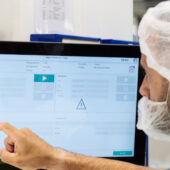In many companies, the Internet of Things (IoT) has evolved from the pilot and test phase to become a strategically relevant technology. Read on to learn how Hanspeter Groth, Industry Leader for Manufacturing at Swisscom, would summarise the results of the ‘Internet of Things as a Game Changer’ MSM study and highlight the areas in which the technology is particularly relevant for Swiss companies in the manufacturing industry.
Hanspeter Groth, one in three of the companies surveyed considers the Internet of Things to be a huge opportunity to promote innovation in products and services. What do you think are the greatest advantages for the manufacturing industry?
Digital Manufacturing Services
Industry leaders have increased their productivity by up to 90% through digital transformation. Swisscom specialists support you in the digitalisation of production.
The Internet of Things offers manufacturing companies numerous advantages – both inside and outside the company. Thanks to IoT, paperless or low-paper production is possible on the inside, for example in Früh Verpackungstechnik AG. Outside of companies, the technology is used in the development of smart products and servitization: intelligent products generate data that can be further processed with analytics tools, leading to added value for the customer and an improved customer experience (such as in the case of smart coffee machines, for example). The IoT also enables new business models such as pay-per-use.
Where is the greatest potential for the IoT within production in a company?
For most companies, the potential for digitalisation is much greater in production (the shop floor) than in the IT sector (top floor), where standard software, such as ERP, CRM or PLM solutions, is already established. Processes in production often have media disruptions and are laborious. Many companies are therefore still a long way from being paperless. Production employees often do not have a digital workplace, which leads to inefficiencies in production. The Internet of Things can counteract this by integrating people, machines, things and systems into production – reducing downtime and increasing productivity.
A total of 33% of Swiss companies surveyed consider the Internet of Things to be a major opportunity.
‘Internet of Things as a Game Changer’ MSM study, 2023
Companies that utilise the Internet of Things also have to deal with data-related issues. Which aspects are crucial for manufacturing companies?
The more things are connected, the more data is generated. This data is very diverse and heterogeneous depending on where it comes from – for example, from ERP systems, from IoT devices or from production machines on the shop floor. It is not enough simply to put them in a data lake – which then becomes a data swamp. In order to succeed in generating added value from this data in the long term, it is crucial to draw up and consistently pursue a standardised data management concept that is derived from the business strategy.
In addition to a data management concept, handling large amounts of data also requires a strategic approach to IT architecture. What should manufacturing companies bear in mind in this regard?
Whether data should be held in a cloud, on-prem or in a hybrid solution depends heavily on the specific use case and the company’s technological conditions and requirements. Criteria such as the amount of data, latency and availability of services are important in order to assess which solution is appropriate. For a company that operates international locations and uses global data in real time, such as Geobrugg AG, a cloud solution is the appropriate choice.
A total of 24% of companies use IoT solutions to create new business and service offerings.
‘Internet of Things as a Game Changer’ MSM study, 2023
What specific advice would you give to a company that wants to actively engage with the IoT in the coming months?
Technology shouldn’t be the driver, but rather the business strategy. Companies need to ask themselves where the IoT can bring the greatest benefits to the business. In order to answer these questions and derive a strategy from them, I recommend taking a forward-looking approach to all aspects of the company’s activities – from product development to the integrated supply chain of production to service provision and disposal. Implementation should then take place in agile and small steps, for example with the help of a minimal viable product (MVP) or a proof of concept (PoC).
‘Internet of Things as a Game Changer’ MSM study
Learn how Swiss companies perceive the Internet of Things as a technology and business trend and what impact they expect in the coming months in the MSM study.





